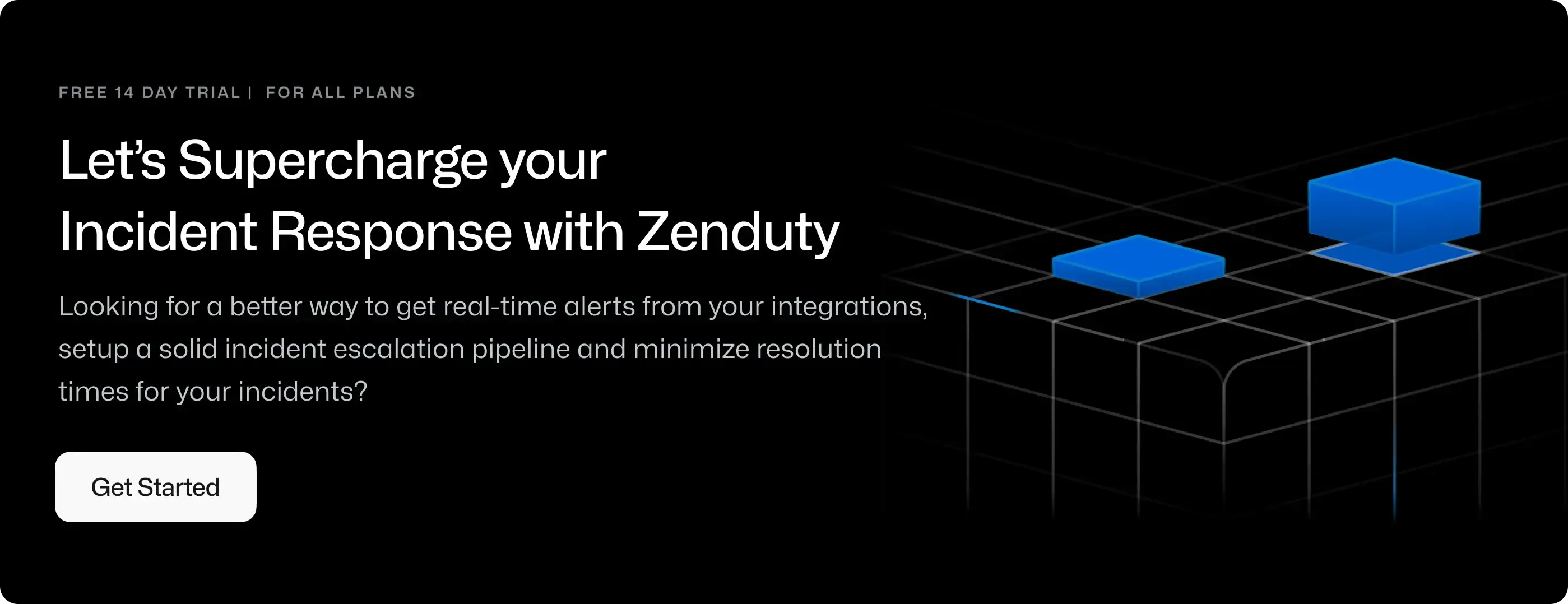Zendesk Integration Guide
Zendesk is a customer service software and support ticketing system.
Zendesk unifies multi-channel customer service (ticketing, self-service, live chat) while offering insightful reporting, facilitating streamlined workflows, empowered customers, and data-driven service optimization.
What can Zenduty do for Zendesk users?
With Zendesk's Integration, Zenduty sends new Zendesk ticket alerts to the right team and notifies them based on on-call schedules via email, text messages(SMS), phone calls(Voice), Slack, Microsoft Teams and iOS & Android push notifications, and escalates alerts until the alert is acknowledged or closed. Zenduty provides your NOC, SRE and application engineers with detailed context around the Zendesk ticket alert along with playbooks and a complete incident command framework to triage, remediate and resolve incidents with speed.
Whenever a ticket is created in Zendesk, Zenduty will create an incident. When the ticket status is updated to Pending, Zenduty will auto-ackknowledge the incident. When the ticket is resolved on Zendesk, Zenduty will auto-resolve the ticket.
You can also use Alert Rules to custom route specific Zendesk ticket alerts to specific users, teams or escalation policies, write suppression rules, auto add notes, responders and incident tasks.
To integrate Zendesk with Zenduty, complete the following steps:
In Zenduty:
-
To add a new Zendesk integration, go to Teams on Zenduty and click on the team you want to add the integration to.
-
Next, go to Services and click on the relevant Service.
-
Go to Integrations and then Add New Integration. Give it a name and select the application Zendesk from the dropdown menu.
-
Go to Configure under your Integrations and copy the Webhook URL generated.
In Zendesk:
-
Login to your Zendesk and go to your Admin Settings -> Apps and Integrations & Open Webhooks.

-
Click on Create Webhook. Fill in the form as shown below. In the url field, paste the webhooks url you copied earlier.
Make sure to change the method to POST.

-
To Test the webhook, you'd need to select Custom Test on the Test event source & the request JSON body as shown below:
{ "title": "Test Title from Zendesk", "description": "Test Description from Zendesk", "url": "https://www.zenduty.com/", "id": "1", "status": "info" }- If you got an Info alert from Zendesk, Then the webhook connection is successful.
-
Go to Zendesk -> Admin Settings -> Objects and rules -> Business Rules -> Triggers
-
Click on Add Trigger. Give the trigger name as Zenduty trigger.

-
Under Meet ALL of the conditions, choose Type is Incident or some other value according to your requirements.
-
Under Meet ANY of the following conditions, add two conditions - Ticket is Created and Ticket is Updated

-
Under Actions, select Notify active webhook, and select the webhook created in the earlier steps.
-
In JSON body, paste the JSON below:
{"title":"{{ticket.title}}", "description":"{{ticket.description}}","url":"{{ticket.url}}", "id":"{{ticket.id}}", "status":"{{ticket.status}}"}
-
Click on Save. Your Zendesk account is integrated. Zenduty will now create an incident for every new ticket created on Zendesk.
